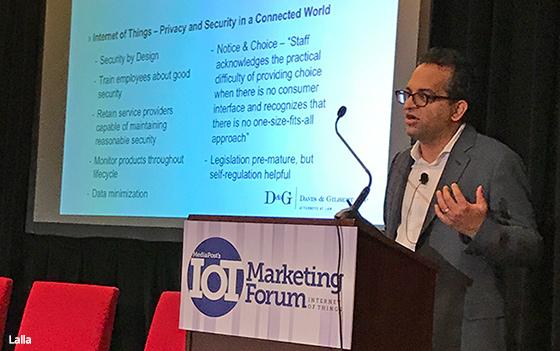Commentary
IoT Legal Issues: It's All About The Data
- by Chuck Martin , Staff Writer, May 19, 2017
Legal departments at brands typically handle legal issues that those brands may come across.
However, some legal issues associated with the Internet of Things may cause companies to approach some uncharted territory.
This became apparent in an insightful presentation by Vejay Lalla, partner, entertainment, advertising and promotions group at Davis & Gilbert, at the second annual MediaPost IoT Marketing Forum in New York this week.
For example, issues with shopper marketing include answering some questions:
- Security by design – Are security issues built in from inception?
- Data minimization – What is being collected, how is it being kept and what is it really used for?
- Notice and choice – Do shoppers know what is being collected, when do they receive notices, do shoppers know what the data is being used for and what is the opt out policy?
At least at the moment, companies must abide by the FTC’s data requirements, including the ‘data minimization’ principle, Lalla said.
There is an obvious split in viewpoint, as Lalla pointed out. While the Federal Trade Commission essentially wants companies to collect and maintain as little data as needed, numerous marketers at the event recommended collecting as much data as possible.
Data issues include how long a company is keeping consumer data, whether the consumer data is securely stored and if the company keeps its privacy promises to consumers.
Some of the legal issues relating to the Internet of Things essentially are not new.
“From a legal perspective, when you’re thinking about the issues that come up, a lot of them are really the same, whether you’re looking at a television spot for a food company or for an IoT product,” Lalla said. “The things that you describe about your product, whether it’s an IoT device or not, need to be accurate and true. For example, if you’re marketing a smart fridge and it’s not actually providing enough cold, that’s a serious issue, from a legal perspective.”
Much of the legal discussion focused on data collection and the potential problems that can be created for marketers.
“When you think about this from a marketer’s perspective, think about what the consumer would reasonably expect you to be collecting from them, and try to market based on that, versus taking that data and using it for various methods the consumer would have just have no expectation of,” Lalla said.
“A lot of the aggregate data you collect may be ok.”
Lalla said the key is to give consumers notice and choice and get their consent.
“Consider when you’re collecting data, what kind of data is it, does the consumer obviously expect you to collect that data, did you collect that data in accordance with your privacy policy, did you give them notice and choice and whether or not you truly need it.”
Legal departments at brands typically handle legal issues that those brands may come across.
However, some legal issues associated with the Internet of Things may cause companies to approach some uncharted territory.
This became apparent in an insightful presentation by Vejay Lalla, partner, entertainment, advertising and promotions group at Davis & Gilbert, at the second annual MediaPost IoT Marketing Forum in New York this week.
For example, issues with shopper marketing include answering some questions:
- Security by design – Are security issues built in from inception?
- Data minimization – What is being collected, how is it being kept and what is it really used for?
- Notice and choice – Do shoppers know what is being collected, when do they receive notices, do shoppers know what the data is being used for and what is the opt out policy?
At least at the moment, companies must abide by the FTC’s data requirements, including the ‘data minimization’ principle, Lalla said.
There is an obvious split in viewpoint, as Lalla pointed out. While the Federal Trade Commission essentially wants companies to collect and maintain as little data as needed, numerous marketers at the event recommended collecting as much data as possible.
Data issues include how long a company is keeping consumer data, whether the consumer data is securely stored and if the company keeps its privacy promises to consumers.
Some of the legal issues relating to the Internet of Things essentially are not new.
“From a legal perspective, when you’re thinking about the issues that come up, a lot of them are really the same, whether you’re looking at a television spot for a food company or for an IoT product,” Lalla said. “The things that you describe about your product, whether it’s an IoT device or not, need to be accurate and true. For example, if you’re marketing a smart fridge and it’s not actually providing enough cold, that’s a serious issue, from a legal perspective.”
Much of the legal discussion focused on data collection and the potential problems that can be created for marketers.
“When you think about this from a marketer’s perspective, think about what the consumer would reasonably expect you to be collecting from them, and try to market based on that, versus taking that data and using it for various methods the consumer would have just have no expectation of,” Lalla said.
“A lot of the aggregate data you collect may be ok.”
Lalla said the key is to give consumers notice and choice and get their consent.
“Consider when you’re collecting data, what kind of data is it, does the consumer obviously expect you to collect that data, did you collect that data in accordance with your privacy policy, did you give them notice and choice and whether or not you truly need it.”




